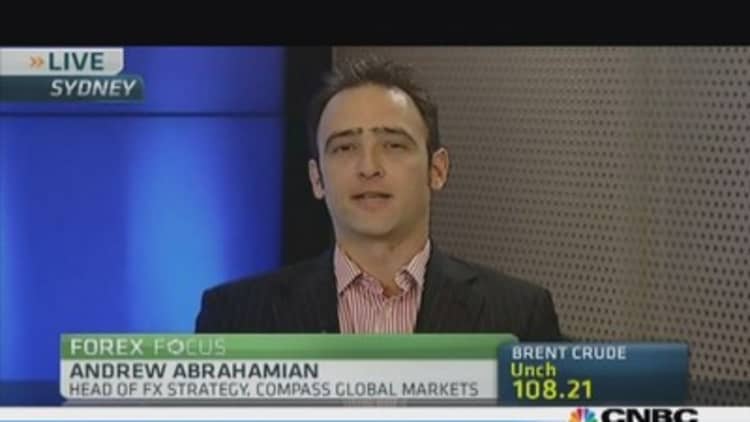The slide in the yuan to near one-year lows has left it at critical levels for holders of an offshore derivatives product, exposing them to heavy losses that may fuel a further slide in the currency.
The yuan's 0.8 percent drop in the three days since the central bank widened its daily trading band has rippled into the offshore market where billions of dollars of leveraged bets were sold to Chinese companies.
(Read more: China's yuan takes first big swing in wider band)
The derivatives - target-redemption forwards - offer regular income to the holders as long as the yuan does not weaken sharply. Deutsche Bank and Morgan Stanley estimate a total of $350 billion of the products have been sold since last year.
Originally sold as a currency hedge, they morphed into a product providing modest income if the yuan stayed above a specific price against the dollar.
For many buyers of the product, it appeared a reasonable bet because the yuan had risen against the dollar in every year since 2010. Last year, it rose 2.9 percent against the dollar.
However, this year the central bank has engineered a fall in the currency to shake out hot money making a one-way appreciation bet on the currency and the decline has accelerated since the trading band widened on Monday to 2 percent either side of the daily fixing.
Traders said debt jitters following the country's first domestic bond default and worries about a slowdown in the economy are also weighing on market sentiment.
(Read more: The yuan trading band has been widened- Now what?)
In onshore trading on Wednesday the spot rate of the currency fell to more than 6.2 per dollar, while in the offshore market in Hong Kong it hit 6.1855, some of the currency's lowest levels since last April. More importantly, that is deep in the strike zone of 6.15 to 6.20 where most of the products were sold and where holders are exposed to losses.
"The offshore yuan may fall more as banks hedge their structured products exposure via the derivatives market which may exacerbate the selloff in the currency," said Geoffrey Kendrick, head of Asia FX and rates strategy at Morgan Stanley in Hong Kong.
Every pip the yuan stays below the strike levels, holders are counting losses on their holdings. Five market sources estimated losses of $3 billon had already been racked up in the past week or so.

If holders of these products rush to unwind their positions, it would push the yuan down further. Banks also need to hedge their positions via the derivatives markets, and given the asymmetrical nature of the products that could also result in downward pressure on the yuan.
Market players say that if the offshore yuan falls to 6.20 yuan per dollar, it will trigger major requirements for holders to make payments to their counterparties.
Morgan Stanley said it expects holders to face potential losses of up to $200 million per month if the yuan holds below 6.20 yuan per dollar. With average maturities of the structured products around 24 months, total losses could run into billions of dollars.
However, the yuan would have to remain consistently below 6.2 per dollar for such heavy losses to accumulate.
(Read more: Default risks trigger fresh fears over China property market)
While one-year offshore forwards, or non-deliverable forwards, are suggesting the yuan will reach 6.22 per dollar in a year, ANZ predicts the currency will be valued at 6.08 per dollar at the end of this year.
Watch
Derivative markets though are also signalling more yuan weakness.
Implied volatility on one-month dollar/yuan options, a gauge of perceived price swings, headed back towards a record on Wednesday and double the levels seen in all of 2013. Forward options points indicated more selling pressure.
The greater the volatility the more that banks will have to hedge their positions by buying dollars in the cash and derivative markets.
"Watch the vol," said the head of a currency trading desk at a European bank in Hong Kong, who declined to be identified because he was not authorised to speak openly to the media.
With the central bank signalling its comfort with a weaker currency, the absence of dollar selling by companies has only accelerated the fall in the yuan.
(Read more: Will China's slowdown benefit the rest of the world?)
"They are sending a message that you don't speculate on the yuan," said the executive director of an Asian macro hedge fund in Hong Kong, who also declined to be identified in the absence of authorisation to speak openly to the media.

